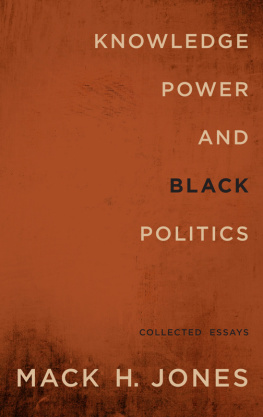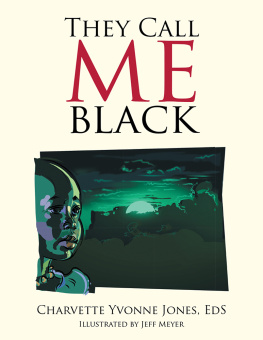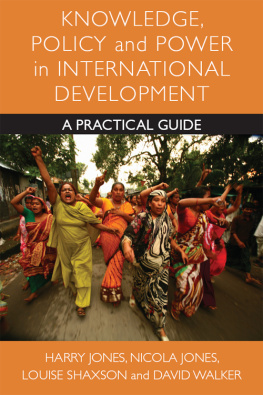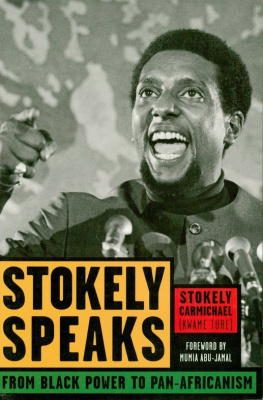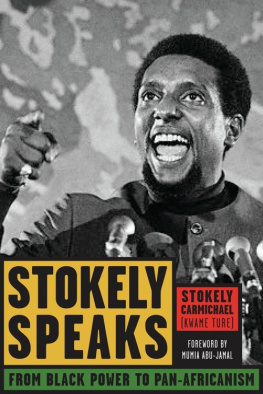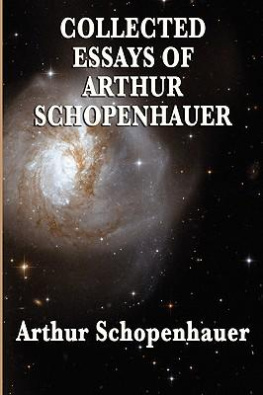Knowledge, Power, and Black Politics
SUNY series in African American Studies
John R. Howard and Robert C. Smith, editors
Knowledge, Power, and Black Politics
Collected Essays
MACK H. JONES
Published by State University of New York Press, Albany
2014 State University of New York
All rights reserved
Printed in the United States of America
No part of this book may be used or reproduced in any manner whatsoever without written permission. No part of this book may be stored in a retrieval system or transmitted in any form or by any means including electronic, electrostatic, magnetic tape, mechanical, photocopying, recording, or otherwise without the prior permission in writing of the publisher.
For information, contact State University of New York Press, Albany, NY
www.sunypress.edu
Production by Dana Foote
Marketing by Kate McDonnell
Library of Congress Cataloging-in-Publication Data
Jones, Mack H.
Knowledge, power, and Black politics : collected essays / Mack H. Jones.
pages cm.(Suny series in African American studies)
Includes bibliographical references and index.
Summary: This collection of essays develops an alternative framework for describing and explaining African American politics and the American political system and applies it to a number of pertinent case studiesProvided by publisher.
ISBN 978-1-4384-4907-4 (hardcover : alk. paper)
1. African AmericansPolitics and government. 2. African AmericansPolitics and governmentCase studies. 3. RacismUnited States. 4. United StatesRace relations. 5. United StatesPolitics and government. I. Title.
E185.615.J63 2014
320.97308996073dc23
2013002443
10 9 8 7 6 5 4 3 2 1
Contents
Figures and Tables
FIGURES
TABLES
Foreword
When Mack Jones earned his PhD in 1968, the study of African American politics in the discipline of political science was almost nonexistent. Only a few articles had appeared in the journals, and the number of books could be counted on the fingers of one hand. During the past forty years, this situation gradually improved to the point where today the study of the politics of race and inequality may be said to be institutionalized within the discipline. Jones is among the handful of political scientists responsible for this development.
Early in his career, Jones was among those who forcefully and effectively challenged the discipline to recognize the legitimacy and relevance of studying the politics of blacks and other subordinated groups. Jones also challenged the dominant theories, paradigms, and approaches to the study of black political life, setting forth alternative perspectives relevant to the aspirations of blacks for power and freedom. Beginning with his 1969 essay A Frame of Reference for Black Politics, Jones wrote a series of important articles and book chapters that constitute a foundational stone for the edifice of scholarship that makes the case for and sketches the contours of black politics.
For many years, I have been urging Professor Jones to agree to the publication of a collection of his essays in the State University of New Yorks African American Studies series, in order that they might be easily accessible to scholars and students. I was therefore pleased when at the 2008 meeting of the National Conference of Black Political Scientists he finally consented to the preparation and publication of this collection. This volume should be published in a university presss African American Studies series, because through Jones writings we can trace the development, evolution, and maturation of a black perspective in the scientific study of politics and its impact on the disciplineand to some extent the political status of black people.
Jones is one of the few political scientists in the study of black politics who has paid careful attention to problems of epistemology, theory, and methodology in understanding the politics of race and then applied this understanding systematically to conduct studies in politics and public policy. The collection begins with his epistemological and theoretical essays, proceeds to a series of case studies, then to essays on public policy, and ends with a set of critical commentaries and reviews.
From the first to the last essay, students are able to see how good political science does not proceed in epistemological and theoretical vacuums; and how a scholar can work with commitment to the liberation of African peoples while adhering to the highest standards of objectivity and methodological rigor.
In the past thirty-five years, more than thirty titles have been published in the State University of New York Press African American Studies series. Several titles have received distinguished awards and are widely cited in the literature. The Jones collection will add luster to this catalog.
Robert C. Smith
El Sobrante, California
April 2011
Notes
. Jerry G. Watts, Political Science Confronts Afro-America: A Reconsideration, in African American Perspectives on Political Science, ed. Wilbur Rich (Philadelphia: Temple University Press, 2007).
. Earl Picard, An Assessment of the Works of Mack Jones on the Development of Black Political Science: Introduction to a Symposium, National Political Science Review 9 (2003), 230235.
Introduction
Perhaps the most compelling question facing social scientists, especially those being trained and inducted into the profession, is how do we come to know what we think we know. That became clear to me while a graduate student at one of the premier U.S. research universities. As a graduate student in political science during the early 1960s1962 to 1966I was the only one or one of only two African American students in the class and quite often my interpretation of problems and issues discussed and analyzed in the classes and seminars differed from those of my white professors and classmates. The differences were neither hostile nor mean-spirited. They were simply differences. I remember a weekly seminar in U.S. State Government in which students researched a particular problem and presented their findings and policy recommendations. Invariably my interpretation of the problem differed from that of my white classmates. After a few weeks into the semester, the professor and my classmates also recognized the difference and would automatically turn to me after a classmates seminar presentation and ask for my alternative response even when I was not disposed to offer one. This experience stimulated my thinking about questions of epistemology, that is, how do we come to know what we think we know, and why did my interpretations differ from that of my white classmates.
After immersing myself in the available literature and reflecting on the matter, I concluded that understanding the worldview of a people was the key to understanding their social science because the worldview conditioned both their description of their reality and the future they hoped to construct. Perceived discrepancies between their current reality and the desired future constituted the problems to be addressed by their social science. The paradigms and frames of reference used by social scientists, I concluded, are all conditioned by the societal worldview. U.S. social science, I concluded further, was organized around the white U.S. worldview, a worldview that that not only celebrated white U.S. culture and domination but one that also incorporated an unenlightened interpretation of the African American presence and experience in U.S. history and culture. Consequently, I reasoned, the scholarship driven by such a worldview would necessarily have only limited utility for conceptualizing problems confronting African American communities. What was needed, in my estimation, was a social science that grew out of a worldview to be found in the culture and lived experiences of African Americans. Such a social science would necessarily raise different questions and in the process create a substantively different social science.


